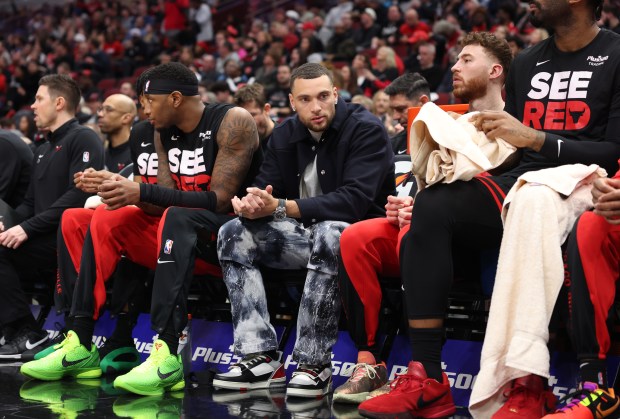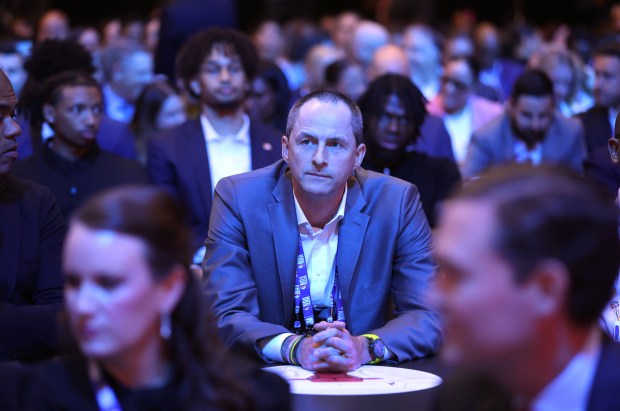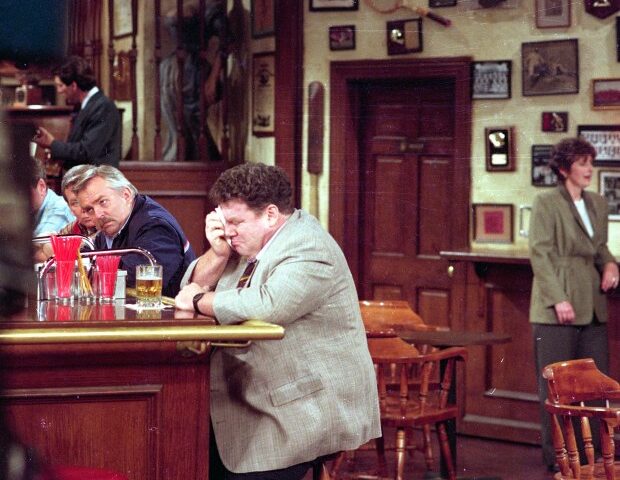Another season under .500. Another meltdown in the play-in tournament. Another year without a trip to the NBA playoffs.
Is that competitive?
Executive vice president of basketball operations Artūras Karnišovas fixated on that word when the Chicago Bulls went a third straight year without making a single move at the trade deadline in February.
It didn’t matter if the Bulls were floundering through injuries and reeling from Zach LaVine’s trade request and scrabbling to get back above .500. All that mattered, Karnišovas said, was if the Bulls could stay competitive at the end of the season with the best of the Eastern Conference.
And for a third straight season, the roster Karnišovas assembled provided a resounding answer: They cannot.
The Bulls can’t compete in the East. Not in 3-point shooting or scoring or team defense. Certainly not in the postseason. And Karnišovas addressed this truth Saturday during his final media availability of the 2023-24 season: If he truly wants the Bulls to become competitive, something needs to change.
“We’re not here for the play-in,” Karnišovas said. “It’s a team game and we have to make changes to fix things. I take full responsibility for where we are right now. I know that our fans aren’t satisfied with where we finished the season, and neither am I.”
If anything, this season was a reflection of players — both individually and as a collective — finding ways to succeed despite the roster construction.
DeMar DeRozan will be a finalist for Clutch Player of the Year again. Coby White ranked in the top five of Most Improved Player odds for most of the season. Alex Caruso is projected to land on an All-Defensive Team for a second consecutive year. This group registered a 27-17 record in clutch games and crawled out of a 5-14 hole in a resilient performance reflective of a fairly cohesive locker-room dynamic.
But it also remained inhibited by a vision for the roster that wilted three years ago. Heading into this offseason, Karnišovas acknowledged that the current roster is no longer sustainable. Although he did not commit to a full rebuild, he pledged to utilize the draft, trades and free agency to make changes.
“I am not here to stay in the middle,” Karnišovas said. “The formula we came up (with) three years ago, I thought it was working. … This group hasn’t worked. There’s a lot of great things in certain individual players and a lot of young guys who took a step forward and it’s positive. But in totality as a group it didn’t work. So I’m going to have to find these answers in (the) offseason.”
Any significant move this summer will feel like a tide change after three years of near inaction. The Bulls have made only one trade in the last 31 months — moving up into the second round to acquire Julian Phillips in the draft in June. They stood pat at three straight trade deadlines, watching as the rest of the East contenders reconstructed and recalibrated to get ahead.
It’s understandable why Karnišovas balked in 2022. Losing a starting point guard is an upheaval. Watching that injury stretch out into obscurity is even more confusing. And it makes sense the Bulls needed time to begin making changes.
But that was two years ago — a lifetime in the scope of an NBA front office. What’s unacceptable is how Karnišovas allowed hesitancy to become the status quo — practically a way of life — for the Bulls in the aftermath. Windows of opportunity have opened and slammed shut. But the front office has shown a consistent fear to take anything resembling a step backward — or even sideways — that could result in two steps forward in the future.
The inability to move LaVine this season is an encapsulation of that meekness. When reports surfaced in November that LaVine wanted a trade out of Chicago, it was a symbolic breaking point. Through ups and downs, LaVine had been the foundational centerpiece of the Bulls for years, a player whose loyalty remained consistent despite losing seasons in Chicago and Minneapolis.

LaVine’s willingness to leave seemed likely to produce a sad conclusion to his tenure in Chicago. But if he was ready to give up on the project, it at least meant something would change. And after months of inaction, that felt like a relief in itself for many Bulls fans wondering how things could both stay the same and get better.
Instead, the Bulls let the moment pass. Five months later, LaVine is still a Bull. And coming off an injury, the task of offloading him will be just as difficult this summer — and even more of a necessity.
Karnišovas said he doesn’t have any regrets for how he handled trade windows this season.
“I’m always open to doing deals that are going to improve the team,” Karnišovas said. “When we didn’t see that there were deals available to improve the team and to still compete for a playoff spot, I’m not going to do it. So I think going into this offseason, we’re going to be more aggressive to look to improve this team.”
However, Karnišovas has finally vocally accepted that his framework for the Bulls roster is not successful. For all the external pressure levied by the fan base, Karnišovas said he has not felt urgency pertaining to his job security from Jerry and Michael Reinsdorf.
But after missing the playoffs for a second year in a row, dissatisfaction has become too much of a staple in Chicago. If Karnišovas still craves a competitive team, the changes will have to begin this summer.
“It’s a result-driven business and I’ll be evaluated based on results and I expect that,” Karnišovas said. “I just have to do a better job putting the group together. We all want to win. That’s why I’m here. That’s what I’m going to try to do every year.”




